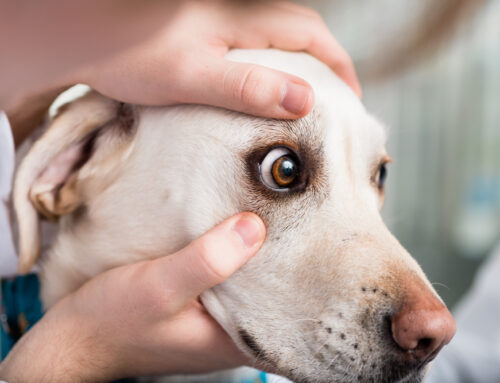Everyday, veterinary oncology specialists around the country help thousands of pet owners make difficult decisions about pet cancer treatment options. But increasingly, many veterinarians are also using their animal cancer research experience to better understand how cancer might be treated in humans, too.
The collaborative approach between cancer research, human health, and veterinary oncology services is what’s known as comparative oncology, and it’s the subject of a new documentary being produced by Colorado State University and Rocky Mountain PBS.
Unfortunately, cancer doesn’t discriminate between humans and animals. However, that means scientists can learn more about the disease by studying how animals respond to pet cancer treatment options.
“Cancer is cancer,” explained Dr. Rodney Page, a CSU professor and director of the Flint Animal Cancer Center in Fort Collins, Colorado. “The same mechanisms that result in cancer in humans are operative in dogs, and are operative in other animals as well. The aspect that is valuable is the information that can be gathered through well-done clinical studies in companion animals with naturally occurring cancers.”
Some 46.3 million households have dogs, and their role as “man’s best friend” may prove beneficial to human health in more ways than one. As the name of the documentary suggests, The Answer to Cancer May Be Walking Right Beside Us, the similarities between animal and human cancers are often striking.
Thanks to veterinary oncology, scientists have made discoveries like a limb-sparing technique that helps human bone cancer patients — particularly children — avoid amputation. The idea was first successfully tested with animal patients through the collaborative work of Dr. Ross Wilkins, an orthopedic surgeon, and Dr. Stephen Withrow, a veterinary oncologist.
“People need to realize that animals get cancer and that owners want their animals cured and cared for,” Withrow says in a trailer for the documentary, “Why not extrapolate that to humans?”
The documentary also features research from and interviews with experts from the American Cancer Society, the National Cancer Institute, Duke University, Ohio State University, and more.
“Cancer experts at Colorado State University have long advocated the value of comparative oncology in the fight against cancer in all species,” said CSU Vice President for External Relations, Tom Milligan, who hopes the new documentary will teach a wider audience about comparative oncology.
We want to be your best friend’s best friend! To learn more about your pet cancer treatment options and veterinary oncology in Arizona, contact the Southern Arizona Veterinary Speciality and Emergency Center today. Our Veterinary Specialty Hospital and Emergency Center in Tucson, Arizona, can provide pet ultrasounds, ophthalmology, oncology, dentistry, surgery, and more.








Leave A Comment